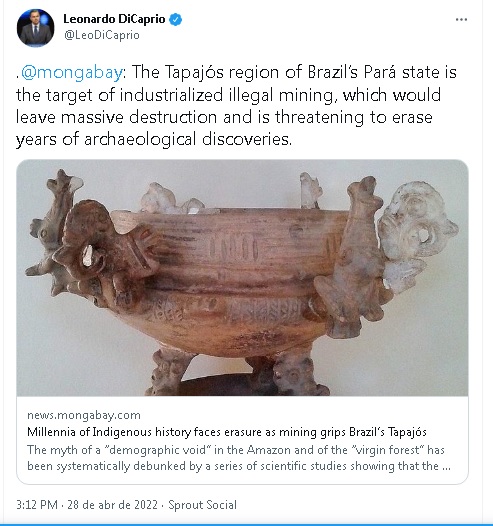By Isadora Soares Armani, International Rivers’ Senior Communications Associate
The actor and environmental activist Leonardo DiCaprio used his Twitter account to support the Tapajós river basin, one of the five largest regions of the Amazon hydrographic system. DiCaprio shared an exclusive interview by Mauricio Angelo, a journalist of Mongabay, about the International Rivers’ study, “Tapajós Sob o Sol: Diving in the ecological, sociocultural and economic characteristics of the watershed”, released this February. In the piece shared by DiCaprio with his 19.6 million followers, archeologist Bruna Cigarran da Rocha, one of International Rivers’ researchers on the study, talked about the importance of preserving the region as a heritage of human history.
With “Tapajos Sob o Sol,” International Rivers sheds light on the Tapajós River basin, providing an updated x-ray on this area, warning of threats in the region and reinforcing its potential for a sustainable social bioeconomy. The study reveals that artifacts such as projectile points made of chipped stone have been found in different places of the Tapajós and its tributaries.
“The study ‘Tapajós Sob o Sol’ brings light to one of the main hydrographic basins in the Amazon region, which, despite its importance for global biodiversity, is constantly the target of waves of expansion of agribusiness, mining and infrastructure, including large and small hydroelectric plants that are being aggressively installed in the area. Today the region has more than 40 hydroelectric plants planned, apart from the PCHs (pequenas centrais hidrelétricas) that are being studied, and other infrastructure works such as waterways and railways–a strategy known as Arco Norte“, explained Flávio Montiel, director of International Rivers’ Brazil program. “The Tapajós region has important features of preservation, but, if it is not defended in time, the environmental and social consequences will be serious, as we have already seen in the Xingu and other Amazon regions. We need to put our eyes and commitment on the Tapajós River and its tributaries to ensure the safety of the populations that live there.”
The study includes a preface written by sociologist Ailton Krenak, and an introduction by other important leaders of the region, such as Cacique Juarez Saw Mundukuruku (Munduruku indigenous leadership), Father Edilberto Sena (Tapajós Vivo Movement) and Caetano Scannavino (Health and Joy Project). The study was developed by researchers Bruna Cigaran da Rocha, Ricard Scoles, Bruno Peregrina Puga and Ana Blaser and supported by the Moore Foundation.
Isabella Winkler and Josh Klemm, Interim Co Executive Directors of International Rivers, commented: “For more than 35 years, International Rivers has been working to protect rivers and riverine communities throughout the world. It is vital to have public support like this from Mr. DiCaprio and other ambassadors and champions. The Tapajós River basin is an exceptionally important region for the Amazon basin and the Indigenous communities who live there, and it deserves all our attention right now.”

Access the full publication in Brazilian Portuguese. (full mobile version)
Access the Executive Summary (in English and Spanish)
